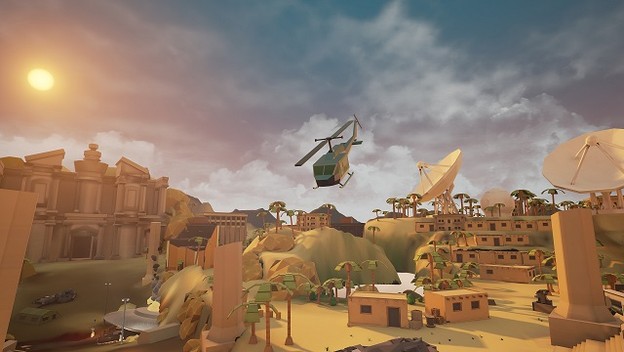A recent reddit post by the CEO of Rocketwerkz has made me rethink my stance on exclusivity in the VR space. Dean Hall, whose company created Out of Ammo for the HTC Vive, came clean about the harsh realities of VR developement, calling it a money-losing prospect at the moment. Although his company didn’t accept any exclusivity agreements or funds for Out of Ammo , he says that most developers simply can’t afford to create VR titles without said funds, because otherwise, the titles are completely unprofitable. In fact, even with those funds, developing for VR is a risky business that puts game creators in a rough spot between economic realities and consumer expectations.
We haven’t heard a lot about the realities of VR from a developer’s point of view yet, and it’s good to get this kind of wake-up call. While gamers remain excited for the future of VR, right now the landscape is mostly full of simple games that are affordable to make and allow developers to get used to the new platform. A large portion of the gaming community would prefer the kind of depth they see in ordinary console games to come to VR, but according to Hall and a few other developers in the reddit thread, that’s not financially viable yet. But when companies do something on a smaller scale or accept an exclusivity agreement in order to partially fund their work, the community turns on them.
Part of the problem is that the VR landscape is currently dominated by small and independent developers who don’t have a giant war chest to devote to VR. Other than Ubisoft, it feels like big publishers are mostly sitting on their hands when it comes to the new technology, waiting for other companies to take the big risks so they can jump in later. If those other companies aren’t making money and end up abandoning VR before it’s widely adopted, does that mean VR could go bust altogether? We’ve seen it happen with other technologies, like 3D gaming.
Should we blame gamers for having inflated expectations, too, or are they just doing what consumers do – waiting for something to be sufficiently to their interest before buying it? I’m of two minds about this. I wouldn’t ever blame people for making wise choices with their money. Part of why the VR audience is small is because the high-quality headsets are still rather expensive. On the other hand, if we really want VR to succeed, we might need to lower our expectations a bit and accept that this is a brand new kind of game platform and there’s a huge learning curve involved in developing for it. We can’t expect the same amount of gameplay with the same level of polish for the same amount of money as we can get with ordinary games. That’s going to drive companies right out of the marketplace.

Now, Hall’s comments were mostly related to the PC market, dominated by the Oculus Rift and the HTC Vive. The PlayStation VR could certainly help to broaden the general VR audience and make development more cost-effective, but as my colleague Christine recently noted , it feels like even Sony is being tentative about VR. I mean, the freaking Vita had more exposure during the 2016 PlayStation Experience keynote speech than the PSVR! Sony has let the holiday season pass the PSVR by, so I’m not sure what the plan is for the peripheral. If Sony doesn’t step up its marketing game and help more developers fund VR games, I don’t know who is going to champion high-quality VR for the masses.
If Hall is right, and we have no reason to believe he’s lying, VR development is going to require more sacrifice and expense for both consumers and developers than a mere new console generation launch. We’re going to have to ask ourselves if we want VR games enough to stick with it through the hard times. Otherwise it feels like both gamers and developers are going to drop the tech while it’s still in its infancy. It’s a tough situation, but as a start, we gamers could probably be a bit gentler to the developers who are stepping up and giving the technology a try. You know, like by not ragging on them too much if they have a timed exclusive and definitely by respecting them enough to not pirate their games. If we do our part, maybe the big money in the game industry will step up and do its part as well. I’d sure like them to, because VR is very promising and I want to see what it can bring us in the future.
